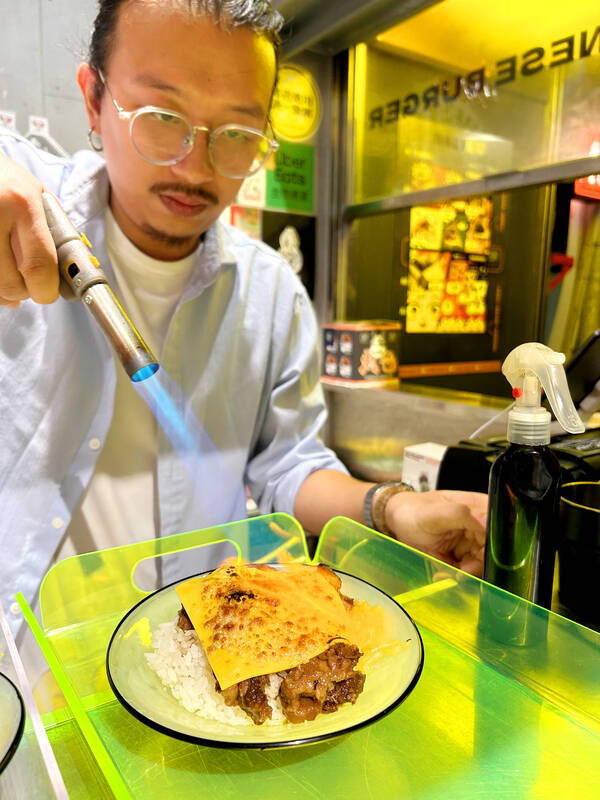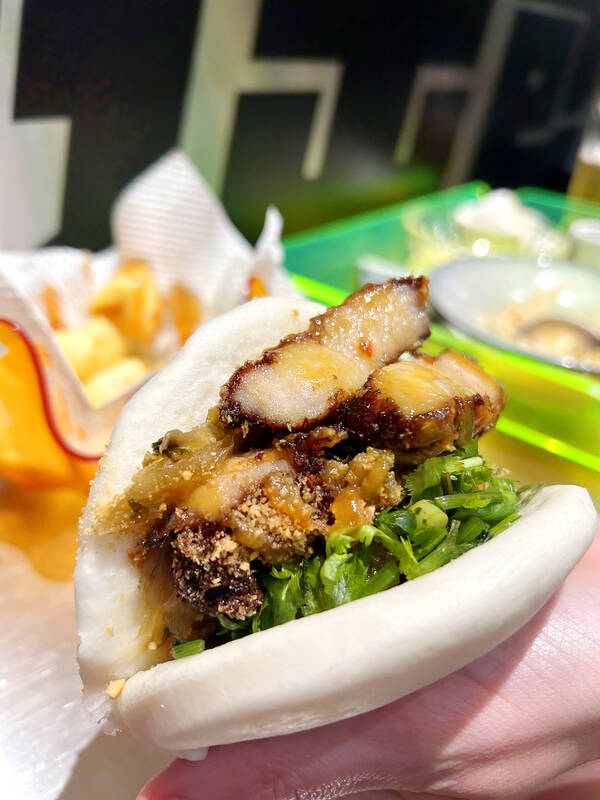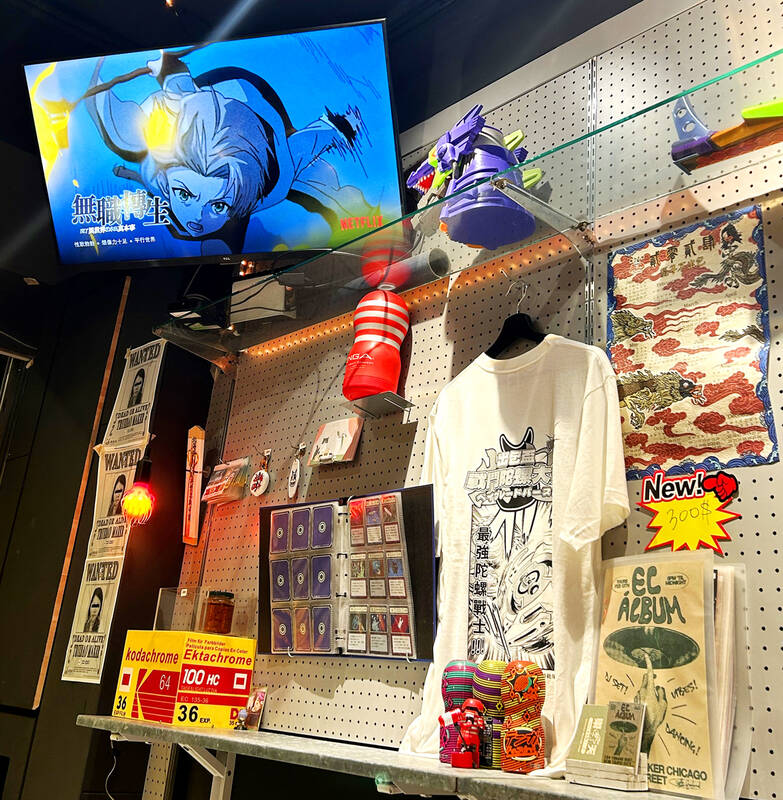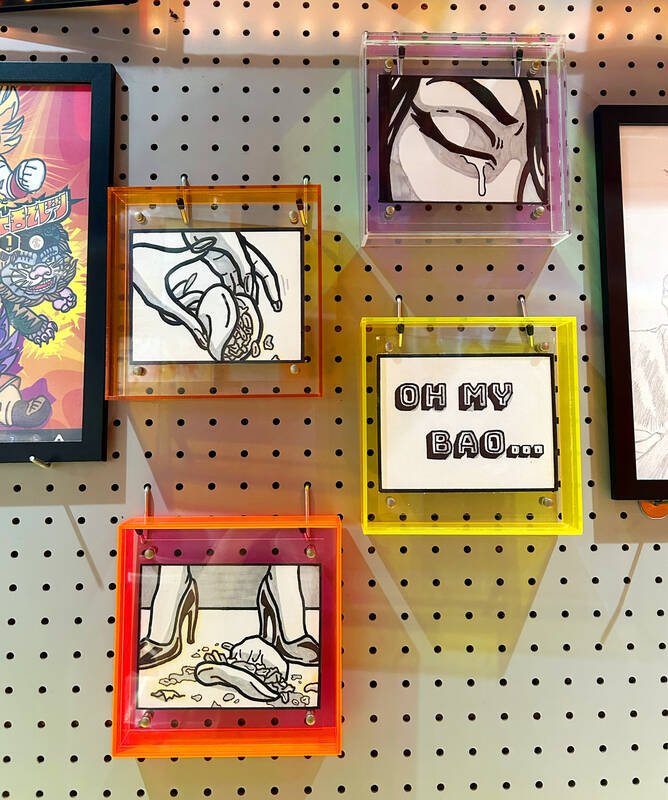Entering from a darkened alleyway, True Bao Maker (有情出包所) hits us with a blast of neon-bright pop-art posters and manga-packed shelves; speakers pump kitschy J-pop while the TV replays anime classics; zingy decor bursting with the Japanese cool of a backstreet Osaka hideout.
Owner Eric Weng (翁竹熲) welcomes us in with a smile and seats us on plastic stools at the open-top-bar, where we get acquainted with him and his childhood friend Alex Huang (黃國勳), a tattoo artist who designed the space using some of Weng’s wacky personal collection. But these guys aren’t just passionate about Japan, they’re dedicated to elevating a Taiwanese classic to a new dimension.
Gua bao (割包). Hailed as Taiwan’s “most world-famous street-food snack” by the Michelin Guide and coined the “Taiwanese hamburger,” this night-market staple features a pillowy bao bun stuffed with fatty pork belly, cilantro, pickled mustard greens and that signature dusting of finely ground peanut.

Photo: Hollie Younger
This delicacy, delicious as it is, requires an affinity for cilantro and gelatinous hunks of pork fat — a tricky feat for many foreigners, myself included.
Perhaps the bao buns we’re more accustomed to are the hybrid burger variety sweeping the Western world, stuffed with fried chicken, shredded duck, any beloved east-Asian culinary caricature. This is where funky fusion venue True Bao Maker fills Taipei’s gap in the market.
BURGERS, BUNS AND BEERS

Photo: Hollie Younger
Tonight was my second foray. I came across it by happenstance on a hungry evening around Chiang Kai Shek Memorial Hall, but a 4.9-star rating on Google reviews is never to be ignored.
First things first, we grab a cool draft pint of locally-brewed Taihu lager — do we want a sake bomb dropped in? Why not — and Weng translates us through the menu, bun by bun.
The cartoon pop-art menu offers four savory and two sweet bao burgers, including vegetarian offerings, sides of fries or fried pumpkin bites and a beef rice bowl, all available in good-value combo sets (NT$180+).

Photo: Hollie Younger
My recommendation is the meatball bao special (NT$150), a true east meets west concoction. Three crispy Italian-style meatballs of hearty ground beef, lashings of rich red wine sauce, American cheese and lettuce — fused with Asian flavors of cilantro, ground peanut, scrambled egg and that perfectly fluffy bao bun to hold it all together. This shouldn’t work, but it’s a fusion masterpiece.
The signature here is the spicy beef bao burger (NT$129); slow-cooked, melt-in-the-mouth with an explosive crimson red, house-made chili sauce. Unless you order medium, this will blow your head off, which is exactly what I was after.
The closest to its gua bao prototype would be the fried pork bao burger with orange sauce (NT$120). Forget Panda Express Orange chicken — we’re talking fresh, punchy citrus glaze that zaps through glistening slices of fried pork — still a gloriously fatty belly cut but with a modern upgrade. Anyone underwhelmed by a night-market bao bun, try this.

Photo: Hollie Younger
Weng says that the venture began as a food truck, and after almost two years of success on the road, they set up here in 2022. On weekdays, head for a solo lunch date perusing his extensive manga collection, but on Fridays, he says this place transforms into an open-door house party for friends and patrons to meet, greet and chow down.
After a double ordering of burgers, we pay a reasonably-priced bill and roll out feeling rather like overstuffed bao buns ourselves. “See you Friday!” Weng calls out. He just might.

The Taipei Times last week reported that the rising share of seniors in the population is reshaping the nation’s housing markets. According to data from the Ministry of the Interior, about 850,000 residences were occupied by elderly people in the first quarter, including 655,000 that housed only one resident. H&B Realty chief researcher Jessica Hsu (徐佳馨), quoted in the article, said that there is rising demand for elderly-friendly housing, including units with elevators, barrier-free layouts and proximity to healthcare services. Hsu and others cited in the article highlighted the changing family residential dynamics, as children no longer live with parents,

It is jarring how differently Taiwan’s politics is portrayed in the international press compared to the local Chinese-language press. Viewed from abroad, Taiwan is seen as a geopolitical hotspot, or “The Most Dangerous Place on Earth,” as the Economist once blazoned across their cover. Meanwhile, tasked with facing down those existential threats, Taiwan’s leaders are dying their hair pink. These include former president Tsai Ing-wen (蔡英文), Vice President Hsiao Bi-khim (蕭美琴) and Kaohsiung Mayor Chen Chi-mai (陳其邁), among others. They are demonstrating what big fans they are of South Korean K-pop sensations Blackpink ahead of their concerts this weekend in Kaohsiung.

Taiwan is one of the world’s greatest per-capita consumers of seafood. Whereas the average human is thought to eat around 20kg of seafood per year, each Taiwanese gets through 27kg to 35kg of ocean delicacies annually, depending on which source you find most credible. Given the ubiquity of dishes like oyster omelet (蚵仔煎) and milkfish soup (虱目魚湯), the higher estimate may well be correct. By global standards, let alone local consumption patterns, I’m not much of a seafood fan. It’s not just a matter of taste, although that’s part of it. What I’ve read about the environmental impact of the

Oct 20 to Oct 26 After a day of fighting, the Japanese Army’s Second Division was resting when a curious delegation of two Scotsmen and 19 Taiwanese approached their camp. It was Oct. 20, 1895, and the troops had reached Taiye Village (太爺庄) in today’s Hunei District (湖內), Kaohsiung, just 10km away from their final target of Tainan. Led by Presbyterian missionaries Thomas Barclay and Duncan Ferguson, the group informed the Japanese that resistance leader Liu Yung-fu (劉永福) had fled to China the previous night, leaving his Black Flag Army fighters behind and the city in chaos. On behalf of the